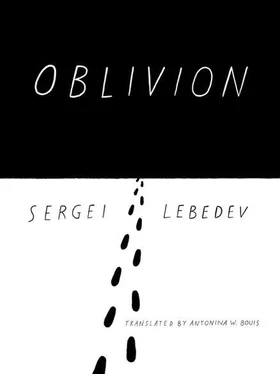The movement halted by the memory of the bridge began again, but in a different iteration; the river, which was part of the dream, suddenly became bigger than it, as if the place where dreams are unfolded has images that cannot be seen awake, that exist only as abstract concepts; images all the more reliable and expressive because familiar real objects serve as their base but which in dreams are perceived not visually but sensually, not as symbols but as forces to which you and the world of the dream are subject.
My consciousness—the consciousness of the sleeper, sensed as light that makes the dream’s reality visible—contracted to a nutshell; the current seized me; it was a strange current, a current in place, as if the source and mouth were both here; the current carried me not away but deeper, a current without distance. However, the current did not only disembody. There was a hint in it, as in rain or wind, of another presence; there was a vague yet clear sense that “someone is there.”
Someone fought the current wordlessly, did not want to yield to it; someone’s exploit was taking place—long ago, forgotten, but still continuing. I understood that there were people there; the ones who left the emptied rooms, to whom the dying things addressed their scream; the bridge—a road to them—had collapsed, but I had managed to cross it.
Thus, through dreams, a person gets the insight of memory: he senses the ominous presence of shaded areas of the past untouched by the light of consciousness; there, in the prison of time, are people, events, and knowledge of oneself that is excluded from the sphere of inner life.
The clairvoyant of memory—that’s who I became in my sleep. The flow of the river into which my dream had turned divided me from myself, tore all the threads that connected consciousness and memory, which allow you to know who you are at any moment in the details of the past; having become no one, devoid of the selectivity in memory predetermined by a personality, I acquired my memory whole all at once.
The power of the water receded; and I learned that the memory of a single man is not a fragile boat. Memory—the way it was revealed to me—was an ark.
In the current, in the movement of water that had seemed empty, islands appeared, banks arose in the distance, and the river became a river again; I had reached the very bottom of the dream where images had no concrete features and now I was returning, moving closer to being awake.
The islands, flat and sad, resemble the islands of northern rivers; consisting of gravel, sand, and soil, they are washed away by every flood, and they wander along the riverbed, cursed by pilots and buoy keepers. These islands are big sometimes, but people don’t even put fishing huts on them; sometimes, if the island has been around a long time, held by river rot, grass runs riot greedily, and tempted by the thick grass, people carry haystacks on wide boats, like wagons, down the river. But cattle eat this grass reluctantly, as if sensing that the stalks and leaves came from empty water, that the grass is extremely hungry and will take away strength without giving a drop, it will not sate them; it will dilute the blood and make watery milk. The next year you won’t be able to find the grass meadow, only shoals instead of an island; islands like this are not mapped and only the villagers near the banks remember where they were.
I noticed that the water was carrying some islands—huge peat floats; somewhere upriver the water was washing away peat deposits; old, darkened wooden crosses stood on one of the peat islands—the river had torn off a piece of a cemetery.
The other islands did not move; their banks seemed to be held down by boulders, fortified. When I got close to one of them, I saw that it was a shore of human faces; people were close together, the first row in water up to their throats, the next stood higher on the sloping bottom, the next even higher, and many rows were only faces for someone looking from the river.
The water did not reflect these faces: the power of regeneration seemed to have been exhausted by the river, and it carried old reflections, blurry and unclear, in which you just make out a cloud, or the blue and white side of a ship, or the rain-gray pine forest on a cliff.
The river water flowed without urgency or pressure, like blood in the veins of a sleeping person; if it were possible to transfer this river from dream to reality, to separate it from the vague banks of dreams and insert it, as into a frame, into the hills and cliffs of any known valley, from a distance it would look like an ordinary river. But on its bank, a person would suddenly sense that it was yesterday’s river; it merely flowed in these parts but no tributary would feed into it, no spring would break through its bottom sands.
The faces of the people in the water and near the water were dark; the current suddenly picked up one or another of them, and his place was taken by the one who had been a step behind him; this is how the river washes away the shore, quietly undercutting the ground beneath the stones. The faces were so dark that it seemed the people had walked underground, not in a tunnel, but through the ground, and particles of dirt had eaten into the skin; there was dirt in their mouths, in their stomachs and lungs, all the body’s spaces were filled by it.
The people were buried alive but did not die in their graves, wandering underground until they reached the riverbank and opened the ground like a door. They came out into a world where a note next to their names on long-ago faded lists asserted their nonexistence, and now death was completing the postponed work in just a few seconds. They saw me, they were all looking at me, and the combined force of their gaze created a vision inside the dream: sandy shoals, fog and smoke, a tall iron boat, the splash of water, huge iron gates open on the hold of the barge, a gangplank with ropes above the water. Up the gangplank in a single file came prisoners, guards, officers, sailors, and engineers—they walked without turning and vanished in the hold, where only the bent metallic ribs were visible. Then the metal doors began to close—on their own, no one set them in motion, neither people nor mechanisms—and they looked back, prisoners and guards together, but there were fewer of them—the others were blocked from my view by the meeting gates. Once again I wanted to stop the gates, insert a wedge, reach out—and woke up, my gaze not recognizing the house because my gaze—like an ark—was full of faces seeking salvation in it.
The dreams came for three days; on the fourth, I realized I had to go to the city where the letters found in Grandfather II’s desk were written, I had to find the one who sent them. That this was the only way to find out something from the past was already clear, but now I sensed that this path had opened; we were mutually ready, I to set out and the path to let me pass.
When you wake up in a train that left a big city in the night, you are surrounded by only vast, expansive things: power lines, rivers, roads, fields. The country comes to the embankment to watch the railcars with the kindly mockery of the permanent toward the transient, and hills and forest edges learn how to be the view from the window; the triangulation towers on local heights—points for attaching geographical coordinates—look like Martian tripods after a failed invasion, but the crosses on churches give optical axes and space is formulated from these buildings; a cross here is not only a symbol of faith but a land surveying tool.
When I opened my eyes we had already passed the central zone and reached the taiga; the train was climbing up the globe, north, along the great canal; somewhere there, beyond the pine forest, waters borrowed from lakes flowed in wooden sluices, the water traveled across granite watersheds; the ships in the narrow canal seemed to be traveling on dry land, the masts high above the trees, and the ship horn chased a long echo; the towns and cities near the railroad stood on the edges of lakes, threaded on the line of the canal, and crane booms and tall trees loomed above the low houses, and it all seemed too big for village life; but the lakes saved everything—spread out with hilly shores.
Читать дальше












